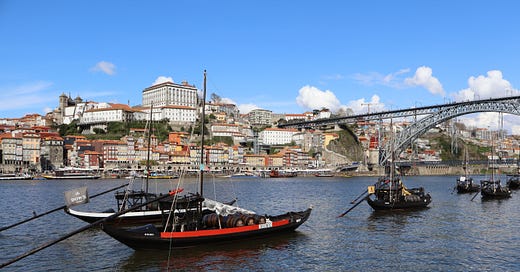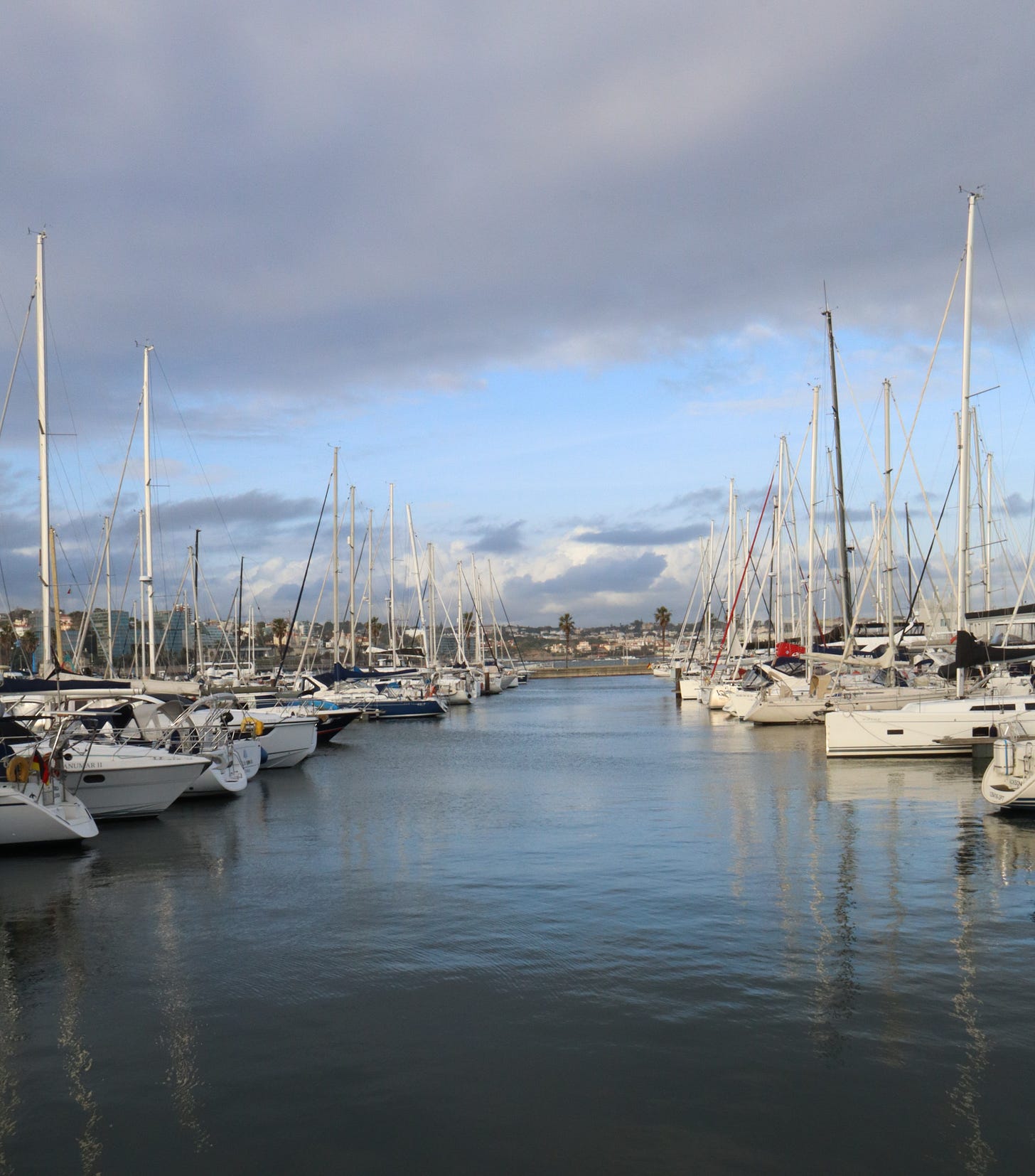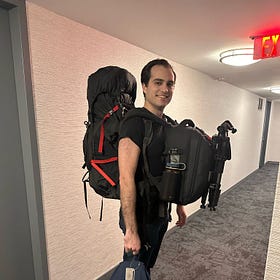Portugal | ties, tradition, and tuk tuks
From family ties to tourism trends—a look at Portugal’s transformation
I landed in Portugal very tired, exactly as I expected. I had just arrived from Marrakech on the first direct flight out to Porto, after very busy days in Morocco (only click the link if you have time, you have been warned).
This is technically my fourth time in Portugal. If you're wondering about the third, it wasn't too long ago, and, though I’m amazed by how much has changed, I’m not sure this is good.
Portuguese Heritage
I was 12 when I first visited Portugal on a family trip my parents had long dreamed of, especially my dad.
Growing up in Brazil, we always felt connected to Portugal in many ways—from the shared history and culture to the colonial architecture still present in many places, including Rio, which became the capital of the Portuguese Empire in the 1800s, and Petrópolis, the Imperial City, where the Portuguese and later the Brazilian royal family spent their summers.
Yes, it is stupid that Brazil once had a monarchy, but oh well, it is part of our history.
Absolutism and colonialism set aside, Portuguese cuisine has long been favored in Brazil, and I remember countless meals at restaurants serving all types of Portuguese dishes.
This was no accident. My great-grandfather emigrated from Portugal in the early 1900s and settled in Petrópolis, where he opened a local pharmacy. My grandfather was born there—Brazilian, of course, but raised in a Portuguese household.
Many years later, my dad was born into a fully Brazilian household but still rooted in the Portuguese world.
Quick pause to say how weird it feels to write “fully Brazilian” because anyone born in Brazil is fully Brazilian! It is not like in the US, where “Italians” don’t speak Italian and have never been to Italy, etc.
Under this context, my dad’s side of the family always cherished Portugal, and in the 2000s, many of us started reconnecting with our roots.
Extending the Family
The trip we took in 2007 wasn’t just a sightseeing vacation.
In addition to visiting museums and monuments, we went to Foz do Sousa, a small farming village near Porto where my great-grandfather lived over 100 years ago before leaving it all behind to move to Brazil.
You may call it the Brazilian Dream, but we couldn’t market it like the Americans.
We met our extended family and stayed with Fernando, one of my dad’s third cousins in Porto, along with his wife Fernanda and their daughter Ana Isabel.
Porto, 18 Years Apart
I was only a kid when I visited Porto, but I remember how traditional it felt. This was before non-Europeans discovered Portugal, turning it into a sought-after destination, and before Portugal adopted a tourism-first strategy to recover from the 2008 crisis.
But returning now, I can’t help but notice how different it feels.
I had a great time visiting Porto this week. I stayed with Ana Isabel, her husband Bernardo, and their two dogs, Kiko and Max. They showed me around and really made me feel at home—exactly what I needed after the hectic travels in Morocco.
Porto is not a massive city, and Ribeira, the historic district, is very charming. It is well-preserved in many ways—the Dom Luís I Bridge hasn’t changed, and what remains of the Muralhas Fernandinas do Porto still stands strong, just like it did almost 18 years ago. All the historic churches and cathedrals remain beautiful and well-kept.
However, a sort of touristic gentrification is happening, which I’ve also noticed in other places I’ve visited. While walking around Ribeira, I realized the shops seemed familiar.
Too familiar.
There is now a Time Out Market charging NYC prices. There’s even one of those rubber duck stores, selling the same rubber ducks made in China and distributed in New York, London, Montréal—you name it. Oh, and I even saw Tuk Tuks in Porto. Why?
Loaf and Breadcrumbs
This is where my issue with this type of tourism begins. If a tourist buys a rubber duck, where does the money go? To the Chinese manufacturer, the store owner, and the real estate owner.
Yes, some of it will go to employees, and there’s also sales tax, but is the bulk of the money staying in Portugal or going elsewhere? If the store and real estate owners are local, then most of it probably stays. But what if they aren’t?
This is just one example, but as Europe becomes less competitive globally, it turns more and more to tourism to stay afloat. But what if it is only getting the crumbs and not the entire loaf of bread moneyed tourists are bringing in?
Before someone says I’m being too harsh on Porto or Portugal specifically, for the record, I was equally shocked when I learned there is a Nobu in Marrakech. It also raises the question: What type of tourist travels only to dine in the same places they would at home?
You could argue that Marrakech is a large city and wealthy locals might be the ones frequenting Nobu. That could be true. But as a former local in Rio, a big city in the Global South, I was always proud to go to trendy, high-quality restaurants that were tied to Rio.
I never thought my experience in Rio was lacking just because there was no Nobu, Zuma, or Tao.
A Stop in Cascais
After Porto, I took a bus to Cascais, where my cousin Flávia lives with her husband Nando, and their daughter Paloma. Reconnecting with family always makes me feel at home, even though I have no fixed address.
Cascais might be one of my favorite spots in Portugal. It’s sun-drenched, scenic, and has become a popular retirement destination for Europeans, Brazilians, and Americans.
Retiring in Florida? That just means you’ve reduced your life decisions to a single word—tax.
Or actually… please keep retiring in Florida. I don’t want to be priced out when my time comes in 30 years.
Upcoming Itinerary
Here is my journey this week:
📍 March 24-27: Madrid, ES
📍 March 28-30: Barcelona, ES
If you have any recommendations, please let me know!
In Case You Missed It
Here are my previous articles:
Spain, Morocco | dancing to the music and the Arabic selling methods
I go to the bus station only to learn that, unlike what is announced on the website, there are no buses on Saturdays. However, I'm told to take a shared cab to Chefchaouen or return the next day for an early bus.
Naturally, I decided to give this shared cab a shot.
Portugal, Spain | a slow start and a much-needed chat across bubbles
I started my trip last Saturday, flying at a familiar time on the airline I’ve used most in my life—but on an unfamiliar route.
Departure | recap of my US experience
Over the last 13 years, I’ve assimilated quite a bit. I still don’t wear a hat indoors, but I have adopted a fair share of American quirks
Destinations | it’s not a vacation
Whenever I mention taking time off work to travel, I often hear, 'Have fun on your vacation!' or something similar. It’s a fair assumption, but a year-long trip isn’t just a vacation—it’s something entirely different.
Trip rules | the world is your oyster
If you had roughly one year to do anything—no obligations, no deadlines—what would you do? Perhaps more importantly, how would you make it happen?
About me | why I travel the world
I started this page to document this year of travel for family and friends, but if you’ve stumbled upon it—welcome! I’m honored that you’re here, and I’d love to share a little about myself.









Estar em Portugal é sempre uma oportunidade de nos conectarmos com nossas raizes e encontrar pessoas queridas. Gosto muito também!